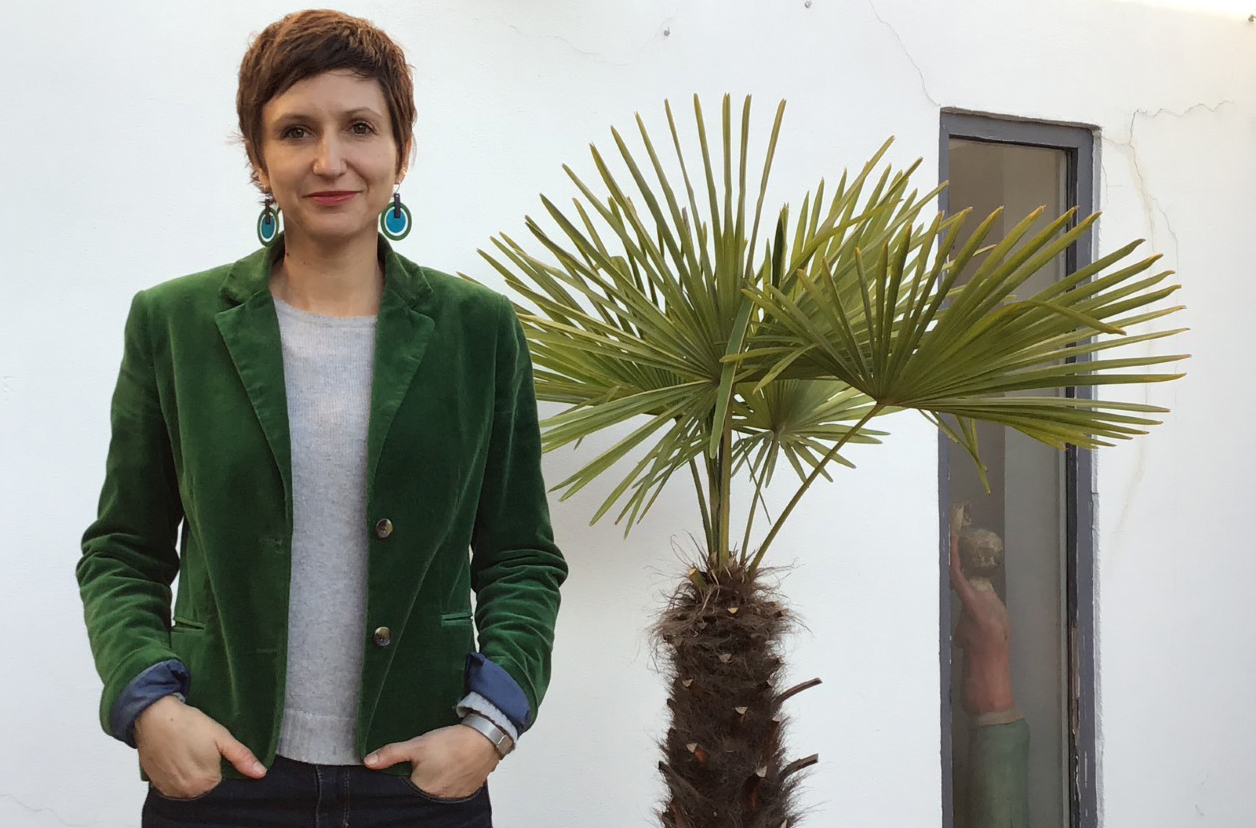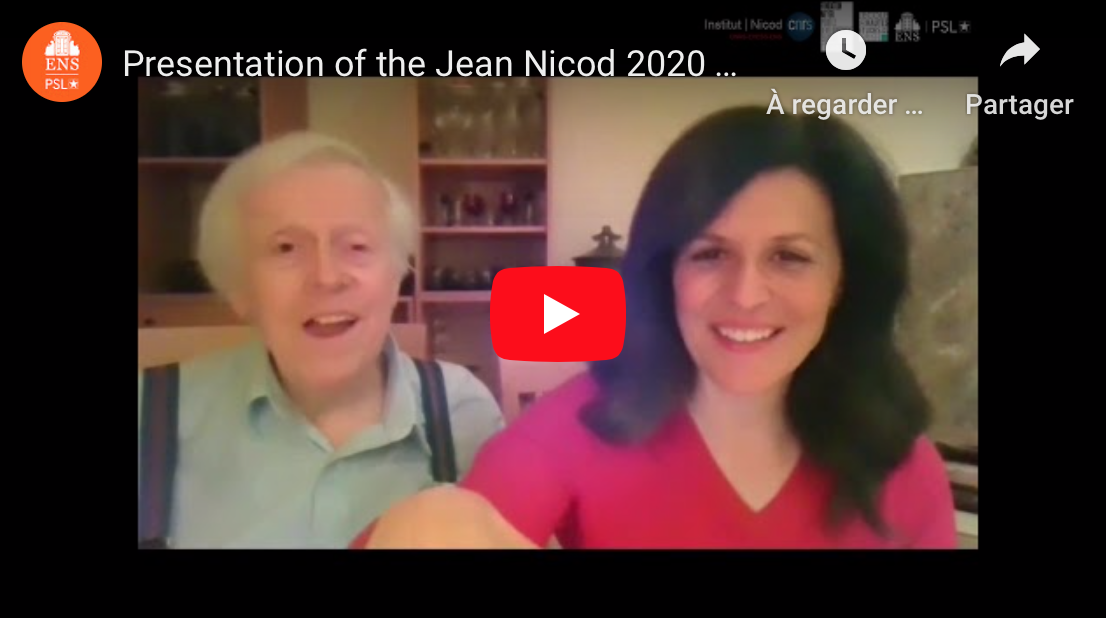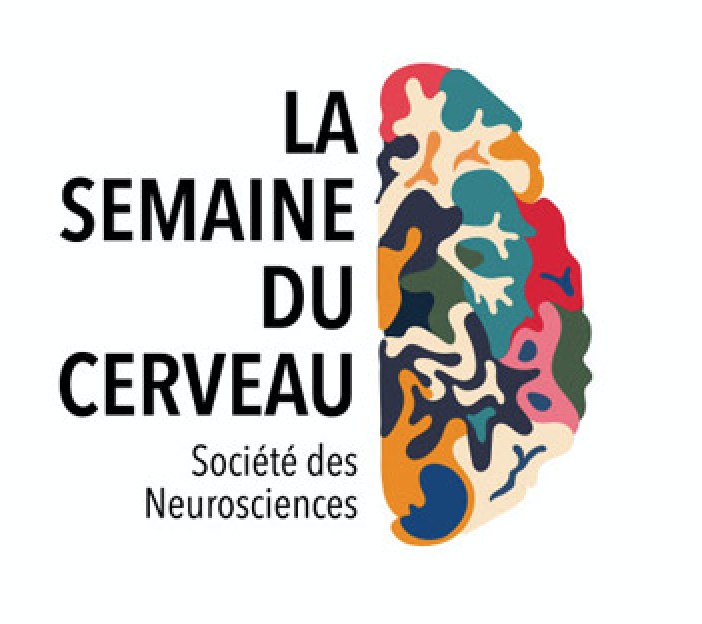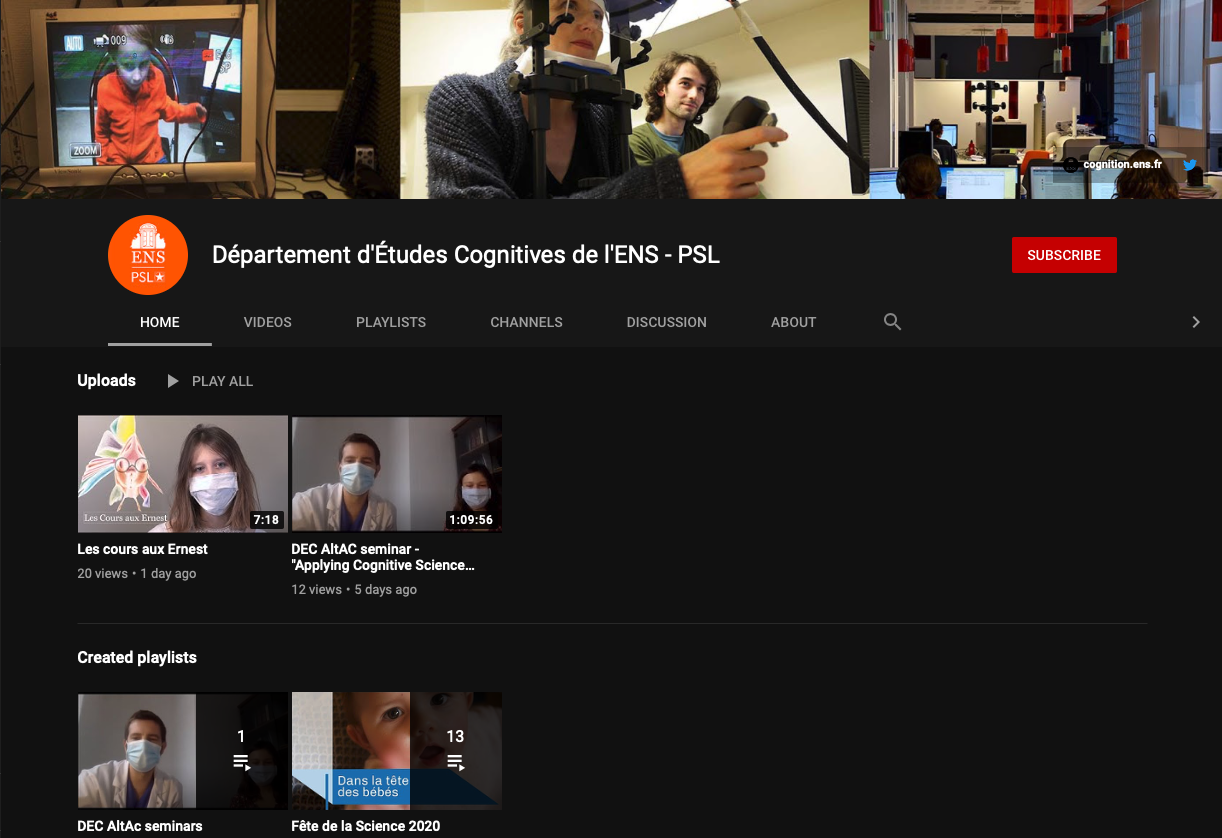RECHERCHE
Le GNT, une équipe transversale de recherche sur les neurosciences théoriques

Le Group for Neural Theory (GNT) est une équipe transversale du DEC dont l’objet principal de recherche porte sur les bases du traitement de l'information dans le cerveau en tâchant d'identifier des liens entre la dynamique neuronale et les bases neuronales des fonctions cognitives. Elle est dirigée par Boris Gutkin, directeur de recherche CNRS, membre du LNC2, spécialiste en neurosciences théoriques computationnelles dont les recherches portent sur la modélisation de la dynamique des circuits cérébraux, la neuromodulation, le comportement motivé, la dépendance, l'apprentissage machine. Boris Gutkin et la chercheuse Sophie Denève, spécialiste de la modélisation du codage neural, sont à l’origine de la création du GNT. Boris Gutkin parle de l'origine cette équipe, de son évolution et des travaux de recherche qui y sont menés.
Lire l'article.
Adios Corona, un collectif d'experts scientifiques pour informer sur la COVID-19. Rencontre avec Charlotte Jacquemot, chercheuse en sciences cognitives.

La normalienne Charlotte Jacquemot fait partie des chercheurs, qui, dès le premier confinement, ont souhaité se rendre utiles dans la lutte contre la COVID-19. Pour la chercheuse, ce sera participer activement au travail d’Adios Corona, un site d’information pour tous les publics, donnant facilement accès aux données disponibles sur le virus. Elle retrace l'origine de cet outil pédagogique, animé par une équipe de scientifiques très mobilisés.
Lire l'article sur le site www.ens.psl.eu.
Imiter, oui, aveuglément, non !
Stefano Palminteri, Emmanuelle Bonnet, Anis Najar et Bahador Bahrami présentent leurs travaux de recherche sur les mécanismes psychologiques de l'imitation et l'impact de l'imitation sur nos choix publiés en décembre dernier dans la revue Plos Biology. Le professeur Patricia Lockwood (University of Birmingham) donne son point de vue sur cette étude dans laquelle elle n'était pas impliquée et parle des implications plus larges qu'elle pourrait avoir. Ses recherches portent sur la psychologie et les neurosciences de l'interaction sociale.
EN SAVOIR PLUS
- Najar A, Bonnet E, Bahrami B, Palminteri S (2020). The actions of others act as a pseudo-reward to drive imitation in the context of social reinforcement learning. PLoS Biol 18 (12): e3001028.
- Site internet de l'équipe Human Reinforcement Learning
- Lire l'article "Imiter, oui, aveuglément, non!" sur le site internet du DEC
CAMPUS
Une année de césure pour explorer les sciences cognitives au service de l’éducation. Rencontre avec Clémence Pichon

Clémence Pichon est normalienne au DEC. Passionnée par les sciences cognitives et l’éducation, elle effectue une année de césure durant laquelle elle participe à un projet ambitieux sur l’éducation au sein de l’Académie de Versailles.
Rencontre avec une étudiante engagée.
Lire l'article
PRIX
Leda Cosmides et John Tooby, lauréats du Prix Jean Nicod 2020

Leda Cosmides et John Tooby, pionniers dans le domaine de la psychologie évolutionniste et des sciences cognitives, se sont vus remettre le Prix Jean Nicod par Marie Gaille, Directrice adjointe scientifique de l’Institut des Sciences Humaines et Sociales (INSHS) le 18 décembre dernier. En raison de la situation sanitaire, la cérémonie a eu lieu virtuellement.
Lire l'article
FINANCEMENT
Le projet DIS-Covid soutenu par l'ANR

Dans la continuité de l’appel ANR Flash Covid-19, l’ANR a lancé le 15 avril dernier un appel "Recherche-Action Covid-19" qui vise à soutenir des travaux de recherche à court terme en lien avec la pandémie. Le projet DIS-Covid, coordonné par Roberto Casati directeur de l'Institut Jean Nicod a été retenu.
Il a pour objectif d’analyser les multiples dimensions de la désorientation pendant la crise Covid-19 (par exemple la désorientation temporelle, sociale ou spatiale), afin de développer un cadre intégratif reliant les formes spatiales et non spatiales de désorientation et d’approfondir notre compréhension des dynamiques sociales, psychologiques et politiques de la pandémie actuelle.
EN SAVOIR PLUS
- ANR "RA-Covid-19"
- Liste des actions autour du COVID menées par l'Institut Jean Nicod.
EDUCATION
Hugo Mercier participe à la série « Opinions et connaissance » proposée sur le site de C.Q.F.D

Hugo Mercier est chercheur à l'Institut Jean Nicod où il travaille principalement sur les mécanismes du raisonnement et l’évaluation de l’information.
Dans le cadre de la série "Opinions et connaissances" disponible sur le site C.Q.F.D de la Main à la pâte, il aborde à travers trois capsules vidéos les idées suivantes : l’ampleur (surestimée) de la désinformation dans nos sociétés, les facteurs qui nous font adhérer à certaines croyances, certains moyens pour renouer la confiance, les mécanismes que nous possédons naturellement, depuis notre enfance, pour évaluer les informations et les sources d’informations.
Cette série est destinée aux enseignants pour les aider à aborder avec leurs éléves la différence entre opinions et croyances d’une part, et connaissances d’autre part.
Voir les vidéos.
DANS LES MEDIAS
Covid-19: comment convaincre les Français de se faire vacciner?

Coralie Chevallier, chercheuse en sciences cognitives, s’intéresse aux mécanismes de la défiance vaccinale et les moyens d’y remédier. Dans des entretiens publiés sur www.lefigaro.fr et sur www.lavie.fr, elle plaide en faveur d'une campagne de communication valorisant la vaccination et insiste sur l'importance de donner la parole à ceux qui n’hésitent pas face au vaccin.
Charlotte Jacquemot, chercheuse et membre d'Adios Corona sur France Inter
Charlotte Jacquemot, chercheuse au sein de l'équipe NeuroPsychologie Interventionnelle du DEC, et membre du collectif Adios Corona, était l'invitée de l’émission Carnets de campagne sur France Inter le 17 décembre 2020.
Adios Corona (www.adioscorona.org) est un collectif scientifique et indépendant de chercheur.e.s qui fournit des explications et des conseils pour agir contre la pandémie de COVID-19.
Ecouter l'émission
Paul Egré à l'honneur du dernier numéro de The Reasoner

Paul Égré est chercheur CNRS à l’Institut Jean Nicod et professeur de philosophie au DEC. Une grande partie de son travail porte sur la sémantique, l'épistémologie, et la psychologie de l'imprécision du langage et de la perception. Certaines de ses contributions les plus récentes concernent les variétés de conséquences logiques et la nature des concepts.
Dans cet entretien publié sur le site http://thereasoner.org, il parle de son parcours et aborde certains sujets parmi lesquels la notion d’imprécision dans la communication et ce que la science peut apporter à la philosophie.
The Reasoner est une publication mensuelle qui met en lumière de nouvelles recherches sur le raisonnement, l'inférence et la méthode au sens large.
Lire l'entretien.
QUELQUES PUBLICATIONS RECENTES
Bourgeois-Gironde, S., Addessi , E. & Boraud, T. (2021). Economic behaviours among non-human primates. Phil. Trans. R. Soc. B, 376(1819). doi:10.1098/rstb.2019.0676
Résumé :
Money represents a cornerstone of human modern economies and how money emerged as a medium of exchange is a crucial question for social sciences. Although non-human primates have not developed monetary systems, they can estimate, combine and exchange tokens. Here, we evaluated quantity–quality trade-offs in token choices in tufted capuchin monkeys as a first step in the investigation of the generalizability of tokens as reinforcers, which is a potentially relevant factor underlying the emergence of money in humans. We measured capuchins' exchange preferences when they were repeatedly provided with 10 units of three token types yielding food combinations varying in quantity and quality. Overall, capuchins maximized their quantitative payoff, preferring tokens associated with a higher food amount, rather than showing violations of rationality. However, some individuals did not maximize their qualitative payoff, possibly because of conditional valuation effects or owing to the choice overload phenomenon, according to which too many options reduce the accuracy of choice. Our study supports the importance of comparative research to finely analyse the multiple components shaping the economic behaviours of other species, possibly to achieve a more comprehensive, evolutionary- and ecologically based understanding of human economic behaviour.
Leptourgos, P., Bouttier, V., Jardri, R., Denève, S. (2020). A functional theory of bistable perception based on dynamical circular inference. Plos computational Biology, 10.1371/journal.pcbi.1008480.
Résumé :
When we face ambiguous images, the brain cannot commit to a single percept; instead, it switches between mutually exclusive interpretations every few seconds, a phenomenon known as bistable perception. While neuromechanistic models, e.g., adapting neural populations with lateral inhibition, may account for the dynamics of bistability, a larger question remains unresolved: how this phenomenon informs us on generic perceptual processes in less artificial contexts. Here, we propose that bistable perception is due to our prior beliefs being reverberated in the cortical hierarchy and corrupting the sensory evidence, a phenomenon known as “circular inference”. Such circularity could occur in a hierarchical brain where sensory responses trigger activity in higher-level areas but are also modulated by feedback projections from these same areas. We show that in the face of ambiguous sensory stimuli, circular inference can change the dynamics of the perceptual system and turn what should be an integrator of inputs into a bistable attractor switching between two highly trusted interpretations. The model captures various aspects of bistability, including Levelt’s laws and the stabilizing effects of intermittent presentation of the stimulus. Since it is related to the generic perceptual inference and belief updating mechanisms, this approach can be used to predict the tendency of individuals to form aberrant beliefs from their bistable perception behavior. Overall, we suggest that feedforward/feedback information loops in hierarchical neural networks, a phenomenon that could lead to psychotic symptoms when overly strong, could also underlie perception in nonclinical populations.
Locke, S., Mamassian, P. & Landy, M. (2020). Performance monitoring for sensorimotor confidence: A visuomotor tracking study. Cognition, 205, 104396. doi:10.1016/j.cognition.2020.104396 (Contrôler)
Résumé :
To best interact with the external world, humans are often required to consider the quality of their actions. Sometimes the environment furnishes rewards or punishments to signal action efficacy. However, when such feedback is absent or only partial, we must rely on internally generated signals to evaluate our performance (i.e., metacognition). Yet, very little is known about how humans form such judgements of sensorimotor confidence. Do they monitor their actual performance or do they rely on cues to sensorimotor uncertainty? We investigated sensorimotor metacognition in two visuomotor tracking experiments, where participants followed an unpredictably moving dot cloud with a mouse cursor as it followed a random horizontal trajectory. Their goal was to infer the underlying target generating the dots, track it for several seconds, and then report their confidence in their tracking as better or worse than their average. In Experiment 1, we manipulated task difficulty with two methods: varying the size of the dot cloud and varying the stability of the target's velocity. In Experiment 2, the stimulus statistics were fixed and duration of the stimulus presentation was varied. We found similar levels of metacognitive sensitivity in all experiments, which was evidence against the cue-based strategy. The temporal analysis of metacognitive sensitivity revealed a recency effect, where error later in the trial had a greater influence on the sensorimotor confidence, consistent with a performance-monitoring strategy. From these results, we conclude that humans predominantly monitored their tracking performance, albeit inefficiently, to build a sense of sensorimotor confidence.
Mercier, H. & Boyer, P. (2020). Truth-making institutions: From divination, ordeals and oaths to judicial torture and rules of evidence. Evolution and Human Behavior. doi:10.1016/j.evolhumbehav.2020.11.004
Vérifier remerciements
Résumé :
In many human societies, truth-making institutions are considered necessary to establish an officially valid or “received” description of some specific situation. These range from divination, oaths, and ordeals to judicial torture or trial by jury. In many cases, these institutions may seem odd or paradoxical, e.g., why would an ordeal reveal a defendant's guilt or innocence? Here we propose to address the questions, why those institutions are considered the source of accepted truth, and why they have recurrent features in many different cultures. Our model is based on two well-documented set of evolved cognitive mechanisms. One is epistemic vigilance, the set of cognitive processes that help us evaluate the quality of communicated information we receive. We show how our epistemic intuitions account for otherwise puzzling aspects of divination, oaths, and ordeals. The other set of mechanisms consists in human capacities for coalition building and the recruitment of social support, which explains how truth-making institutions can be strategically used by individuals to influence mutual knowledge for their own interests. Taken together, these mechanisms explain the kinds of institutions found in small-scale societies (oaths, ordeals, divination), as well as the emergence of different institutions (laws of evidence, judicial torture, trial by jury) in large-scale and modern societies.
Mercier, H., Dockendorff, M. , Majima, Y. , Hacquin, A. & Schwartzberg, M. (2020).Intuitions about the epistemic virtues of majority voting . Thinking & Reasoning, doi:10.1080/13546783.2020.1857306
Résumé :
The Condorcet Jury Theorem, along with empirical results, establishes the accuracy of majority voting in a broad range of conditions. Here we investigate whether naïve participants (in the U.S. and Japan) are aware of this accuracy. In four experiments, participants were provided with information about an assembly voting to decide on one of two options, one being better than the other. In Experiments 1 and 2, participants were provided with specific parameters and they vastly underestimated the probability that the majority would select the right option. In Experiment 3, participants were provided with less specific information, and still underestimated the probability that the majority would select the right option. In Experiment 4, participants were asked to compare majority rules and supermajority rules. Most participants failed to grasp the relative weakness of supermajority rules. Our results are compatible with participant relying on a simple model of the voting situation based either on the competence of an individual voter, or on the minimum proportion required for a majority to form, making them largely blind to the “miracle of aggregation.”
Quintiero, E. , Gastaldi , S., De Petrillo , F., Addessi , E. & Bourgeois-Gironde, S. (2021). Quantity–quality trade-off in the acquisition of token preference by capuchin monkeys (Sapajus spp.) Philosophical Transactions of the Royal Society B: Biological Sciences, 376(1819). doi:10.1098/rstb.2019.0662
Résumé :
Money represents a cornerstone of human modern economies and how money emerged as a medium of exchange is a crucial question for social sciences. Although non-human primates have not developed monetary systems, they can estimate, combine and exchange tokens. Here, we evaluated quantity–quality trade-offs in token choices in tufted capuchin monkeys as a first step in the investigation of the generalizability of tokens as reinforcers, which is a potentially relevant factor underlying the emergence of money in humans. We measured capuchins' exchange preferences when they were repeatedly provided with 10 units of three token types yielding food combinations varying in quantity and quality. Overall, capuchins maximized their quantitative payoff, preferring tokens associated with a higher food amount, rather than showing violations of rationality. However, some individuals did not maximize their qualitative payoff, possibly because of conditional valuation effects or owing to the choice overload phenomenon, according to which too many options reduce the accuracy of choice. Our study supports the importance of comparative research to finely analyse the multiple components shaping the economic behaviours of other species, possibly to achieve a more comprehensive, evolutionary- and ecologically based understanding of human economic behaviour.
Wang, Y., Seidl, A. & Cristia, A. (2021). Infant speech perception and cognitive skills as predictors of later vocabulary Author links open overlay panel. Infant Behavior and Development, 62, 101524. doi:10.1016/j.infbeh.2020.101524
Résumé :
A critical mechanism for maximizing reward is instrumental learning. In standard instrumental learning models, action values are updated on the basis of reward prediction errors (RPEs), defined as the discrepancy between expectations and outcomes. A wealth of evidence across species and experimental techniques has established that RPEs are signaled by midbrain dopamine neurons. However, the way dopamine neurons receive information about reward outcomes remains poorly understood. Recent animal studies suggest that the pedunculopontine nucleus (PPN), a small brainstem structure considered as a locomotor center, is sensitive to reward and sends excitatory projection to dopaminergic nuclei. Here, we examined the hypothesis that the PPN could contribute to reward learning in humans. To this aim, we leveraged a clinical protocol that assessed the therapeutic impact of PPN deep-brain stimulation (DBS) in three patients with Parkinson disease. PPN local field potentials (LFPs), recorded while patients performed an instrumental learning task, showed a specific response to reward outcomes in a low-frequency (alpha-beta) band. Moreover, PPN DBS selectively improved learning from rewards but not from punishments, a pattern that is typically observed following dopaminergic treatment. Computational analyses indicated that the effect of PPN DBS on instrumental learning was best captured by an increase in subjective reward sensitivity. Taken together, these results support a causal role for PPN-mediated reward signals in human instrumental learning.
AGENDA
Semaine du Cerveau 2021 - Cycle de conférences en ligne

Nous sommes très heureux d'annoncer notre participation à la Semaine du Cerveau qui aura lieu du 15 au 21 mars 2021. Le programme complet du cycle de conférences sera très prochainement annoncé sur le site internet du DEC, de l'ENS et de la Semaine du Cerveau ainsi que sur les réseaux sociaux.
Retrouvez les événements en ligne organisés par le DEC sur l'agenda du département.

Certaines de nos conférences sont en accès libre sur notre chaîne youtube (Séminaire DEC AltAc, Fête de la Science), sur le site des Savoirs de l'ENS (Colloquium du DEC, la Semaine du Cerveau) et sur la chaîne youtube de l'école (conférences grand public, Semaine du Cerveau, Nuits de l'ENS etc.)
